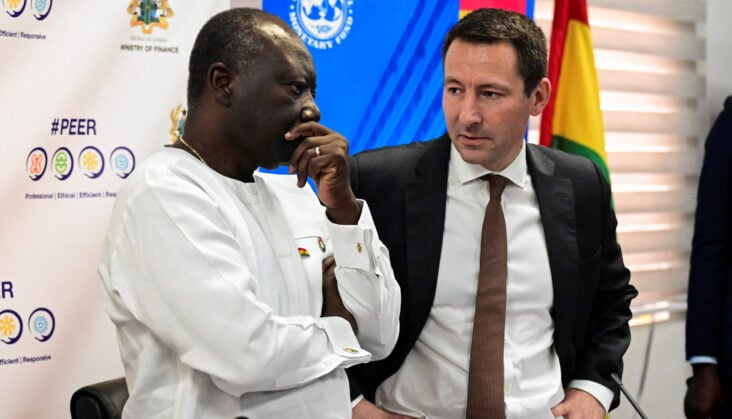
Source: The Africa Report.
Defaulting on external debt in December 2022, the West African country hopes to receive a second disbursement of $600m via the IMF support programme.
Ghana’s success in agreeing to swap about $4bn of domestic debt still leaves a long path ahead to reach financial stability, economists say.
The country, which defaulted on its external debt in December 2022, hopes to receive a second disbursement of $600m under an IMF support programme later this year. Caution is needed as only about $740m of the restructured amount was hard-currency debt, says Leeuwner Esterhuysen, an economist with Oxford Economics Africa.
Ghana’s external financing shortfall for 2023-2027 is around $10bn, which means that over $9bn in external debt still needs to be restructured, Esterhuysen says. It’s currently difficult to tell whether debt restructuring is enough to meet IMF requirements.
The case of Zambia, where the government performed well in terms of structural benchmarks and indicative targets but struggled with a creditor-induced delay on debt restructuring progress, shows the risks, Esterhuysen adds.
While Oxford Economics is “cautiously optimistic†that Ghana is on track to meet the IMF targets, Esterhuysen stresses that “all the information is not available at this stage to be fully confident that the next disbursal can be expected without a delayâ€.
Ghana is “absolutely not out of the woods,†says James Dzansi, an economist at the International Growth Centre in Accra. “What they have so far is nowhere near enough to get them to debt sustainability.â€
The Social Security and National Insurance Trust (SSNIT) in August said that it would participate in the debt exchange and include pension funds. Getting the SSNIT on board, Dzansi says, is not enough to put public finances on a sustainable footing.
Central bank credibility
Ghana’s real GDP growth is set to decline to 1.5% in 2023 from 3.6% in 2022, due to fiscal consolidation, consequences of the debt restructuring on the domestic financial sector and a challenging external environment, according to research from Fitch analysts Thomas Garreau and Jan Friederich published on 1 September.
Fitch argues that Ghana’s banks now face solvency issues due to the hit they took in the domestic restructuring. The agency predicts that the debt-to-GDP ratio will reach 98% at the end of this year.
The IMF programme is “no silver bullet†for the country’s problems, says Esterhuysen at Oxford Economics. Authorities need to broaden the tax base and modernize the collection system to increase revenue, he says.
There need to be reforms to encourage private investment, including improved governance, transparency and public-sector efficiency. “Central bank credibility needs to be reestablished†to rein in inflation, especially in the light of allegations by the opposition of excessive money printing between 2019 and 2022.
The country has to find a way of avoiding its long, repeated cycle of going cap in hand to the IMF, he says.
“Fiscal prudence and commitment to governance will be key to getting fiscal finances in check over the short to medium term and putting the country’s public debt on a sustainable path.â€
Parastatal spending
External debt restructuring needs to happen “as soon as possible,†says Courage Boti, an economist with GCB Capital in Accra. The fact that a counter-offer from creditors has yet to be received signals that the process is likely to run until the end of this year, he says.
“The earlier we redefine terms the better. We can’t get it soon enough.â€
Boti is confident that interest savings from the domestic debt restructuring will help in the short term. Further out, the quality of structural reforms will be key in determining whether Ghana breaks out of the cycle of excessive debt.
One issue, Boti says, is the fact that many parastatal agencies are not yet on the government’s Ghana Integrated Financial Management Information System (GIFIS).
The system aims to ensure that spending is matched with revenues, but having agencies who are outside of it makes new spending hard to monitor. The agencies will need to be integrated into the system by early next year to satisfy the IMF.
Sorting the problem will prevent unseen liabilities from accumulating, and will reduce the opportunities for corruption, Boti says.
Such reforms need to be combined with an extension of the tax net to the informal economy. Boti says that will help to ensure that public finances are sustainable outside of IMF programme periods, as well as during them.



